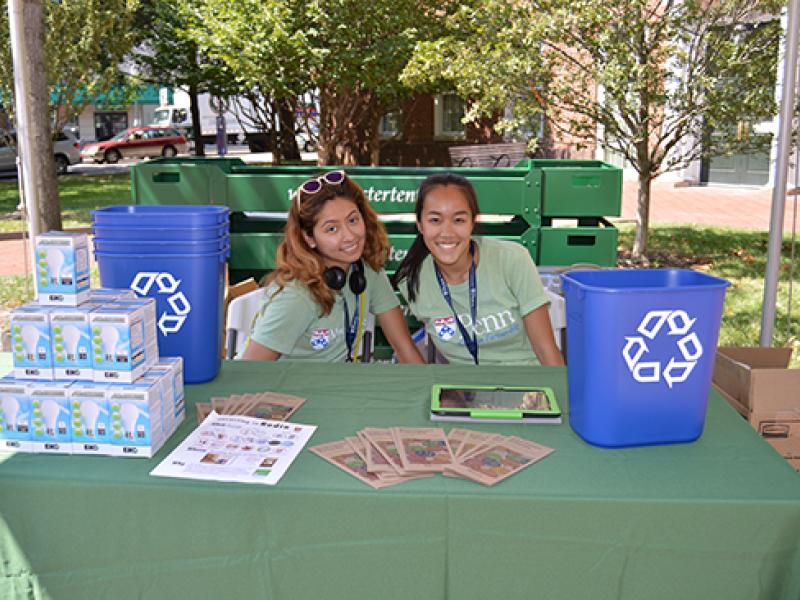Collaborative Efforts
Facilities and Real Estate Services coordinates with the City, students, and other Divisions and Departments at Penn to help the University commence and achieve their sustainable initiatives.
University Collaboration
Environmental Sustainability Advisory Committee
The Environmental Sustainability Advisory Committee (ESAC) is a University-wide committee made up of faculty, students, and staff that was created in response to Dr. Gutmann signing the Presidents Climate Commitment in 2007. ESAC has been charged with the development of a Climate Action Plan for carbon reduction at Penn. The committee is chaired by the Vice President of the Facilities and Real Estate Services. Several staff members from FRES sit on this advisory committee and the six subcommittees. To learn more about the ESAC Committee on Penn's Sustainability website.
Academics
Facilities and Real Estate Services coordinates the Academic Sub-Committee of ESAC. Facilities also works with the Provost's Office, students, and faculty to encourage University-wide support of sustainable efforts. Visit Learning Sustainability for more information.
Student Participation
The undergraduates have formed an organization, the Student Sustainability Association at Penn (SSAP), that helps promote and teach the University community sustainable practices. Facilities and Real Estate Services works closely with the Association as well as our Student Eco-Reps to help disseminate accurate information and to promote the activities happening in our department. We usually can be found at Move-In handing out compact fluorescent light bulbs (CFLs) to encourage more energy-efficient living.

Transportation
Facilities works closely with the Division of Public Safety and the Division of Business Services to set a campus-wide strategy for bike racks, parking, and traffic patterns on and around campus. Facilities further oversees the maintenance of pedestrian paths throughout campus. We also maintain pedestrian paths throughout campus and work with our Penn partners to ensure safe pedestrian and bicycle access. Find more information about Penn's Sustainable Transportation programs on the Sustainability website.
Green Fund Program
The Penn Green Fund is an initiative of Penn Sustainability and is funded by the Division of Facilities and Real Estate Services and the Office of the Provost. The Penn Green Fund welcomes ideas from the Penn community about ways to improve Penn’s environmental performance and reduce carbon emissions. The committee is composed of Penn faculty, staff, and student representatives. Find more information about the Green Fund Program on Penn's Sustainability website.
PennMOVES
In 2008, Business Services launched PennMOVES– Move Out Volunteers Engaging in Service which collects items that Penn students can’t take with them when they leave campus in the summer – clothes, furniture, appliances, books, kitchen gear, toys, sporting goods, and nonperishable food, etc. Rather than ending up in the landfill, these items are gathered, sorted, and then offered for sale. On average, over 90,000 pounds of items are collected each year. Proceeds and additional items are donated to Goodwill Industries. More information can be found on the PennMOVES website.
Collaboration with the Community
Green Building United
Green Building United is a nonprofit membership organization whose mission is to transform the Delaware Valley through sustainable and environmentally responsible planning, design, construction, and operation of the region’s buildings, landscapes, cities, and communities, mindful of the legacy left for future generations.
Bicycle and Pedestrian Transportation
Penn has also been collaborating with different organizations in the City of Philadelphia around bike sharing and bike/pedestrian issues to promote a more sustainable City and to further engage the University with the Philadelphia community. Penn works closely with the University City District (UCD) and UCD’s sustainability efforts.
Contact: sustainability@upenn.edu